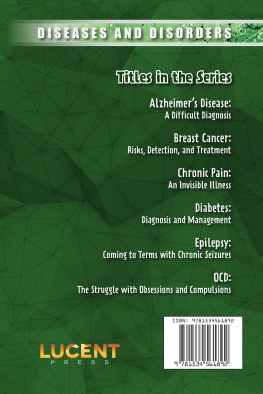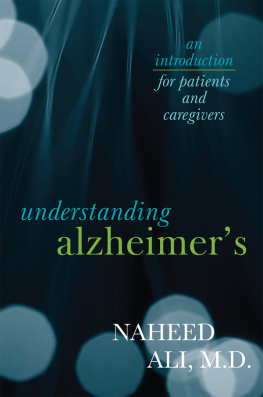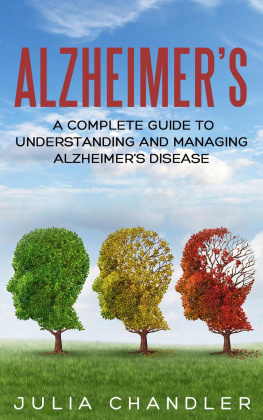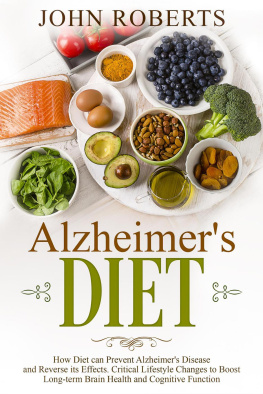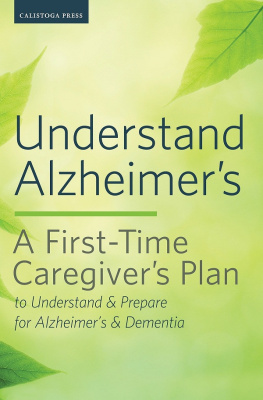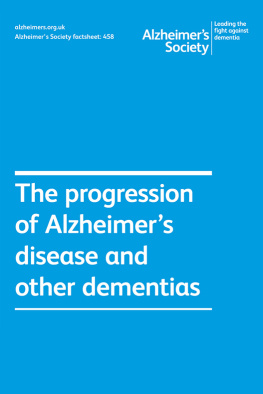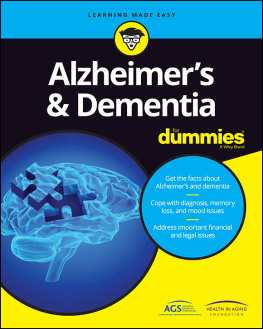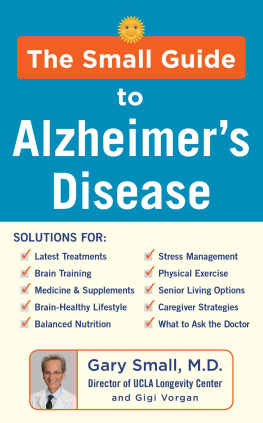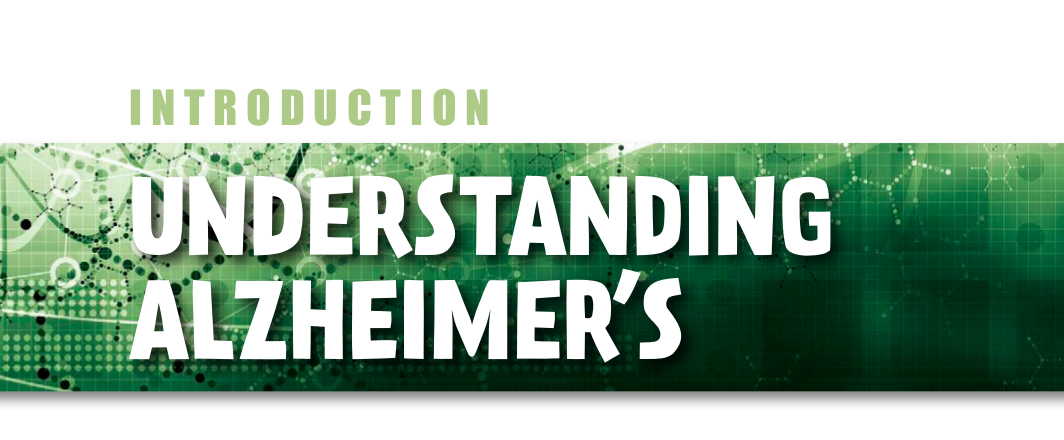Published in 2018 by
Lucent Press, an Imprint of Greenhaven Publishing LLC
353 3rd Avenue Suite 255
New York, NY 10010
Copyright 2018 Greenhaven Press, a part of Gale, Cengage Learning
Gale and Greenhaven Press are registered trademarks used herein under license.
All new materials copyright 2018 Lucent Press, an Imprint of Greenhaven Publishing LLC.
All rights reserved. No part of this book may be reproduced in any form without permission in writing from the publisher, except by a reviewer.
Designer: Deanna Paternostro Editor: Jennifer Lombardo
Library of Congress Cataloging-in-Publication Data
Names: Lombardo, Jennifer, author.
Title: Alzheimer's disease : a difficult diagnosis / Jennifer Lombardo.
Description: New York : Lucent Press, [2018] | Series: Diseases and disorders | Includes bibliographical references and index.
Identifiers: LCCN 2017043598| ISBN 9781534562820 (pbk. book) | ISBN 9781534561892 (library bound book) | ISBN 9781534561885 (ebook)
Subjects: LCSH: Alzheimer's disease--Diagnosis. | Alzheimer's disease--Treatment.
Classification: LCC RC523 .L66 2018 | DDC 616.8/311-dc23 LC record available at https://lccn.loc.gov/2017043598
Printed in the United States of America
CPSIA compliance information: Batch #CW18KL: For further information contact Greenhaven Publishing LLC, New York, New York at 1-844-317-7404.
Please visit our website, www.greenhavenpublishing.com . For a free color catalog of all our high-quality books, call toll free 1-844-317-7404 or fax 1-844-317-7405.


I llness is an unfortunate part of life, and it is one that is often misunderstood. Thanks to advances in science and technology, people have been aware for many years that diseases such as the flu, pneumonia, and chicken pox are caused by viruses and bacteria. These diseases all cause physical symptoms that people can see and understand, and many people have dealt with these diseases themselves. However, sometimes diseases that were previously unknown in most of the world turn into epidemics and spread across the globe. Without an awareness of the method by which these diseases are spreadthrough the air, through human waste or fluids, through sexual contact, or by some other methodpeople cannot take the proper precautions to prevent further contamination. Panic often accompanies epidemics as a result of this lack of knowledge.
Knowledge is power in the case of mental disorders, as well. Mental disorders are just as common as physical disorders, but due to a lack of awareness among the general public, they are often stigmatized. Scientists have studied them for years and have found that they are generally caused by hormonal imbalances in the brain, but they have not yet determined with certainty what causes those imbalances or how to fix them. Because even mild mental illness is stigmatized in Western society, many people prefer not to talk about it.
Chronic pain disorders are also not well under-stoodeven by researchersand do not yet have foolproof treatments. People who have a mental disorder or a disease or disorder that causes them to feel chronic pain can be the target of uninformed opinions. People who do not have these disorders sometimes struggle to understand how difficult it can be to deal with the symptoms. These disorders are often termed invisible illnesses because no one can see the symptoms; this leads many people to doubt that they exist or are serious problems. Additionally, people who have an undiagnosed disorder may understand that they are experiencing the world in a different way than their peers, but they have no one to turn to for answers.
Misinformation about all kinds of ailments is often spread through personal anecdotes, social media, and even news sources. This series aims to present accurate information about both physical and mental conditions so young adults will have a better understanding of them. Each volume discusses the symptoms of a particular disease or disorder, ways it is currently being treated, and the research that is being done to understand it further. Advice for people who may be suffering from a disorder is included, as well as information for their loved ones about how best to support them.
With fully cited quotes, a list of recommended books and websites for further research, and informational charts, this series provides young adults with a factual introduction to common illnesses. By learning more about these ailments, they will be better able to prevent the spread of contagious diseases, show compassion to people who are dealing with invisible illnesses, and take charge of their own health.
M ost people have heard of Alzheimers disease often called Alzheimers or ADbut not everyone understands how it affects its victims and their loved ones. There are many myths surrounding the disease, and the way it is shown on TV and in the movies is not always accurate. Many people believe Alzheimers only affects elderly people or that it simply makes people forgetful. The reality is that Alzheimers is a deadly disease with no currently known cure, and its symptoms can cause a lot of distress for patients and their friends and families.
When Johns father began showing symptoms of memory loss, his family thought it was simply forgetfulness that goes along with normal aging. As the symptoms worsened, they realized the situation was more serious. At age 80, he was diagnosed with Alzheimers.
Johns father and other family members were ready to seek help when they became aware of the problem, but that is not always the case. Alzheimers is such a dreaded disease that sufferers often try to hide their symptoms out of embarrassment or fear of a diagnosis that will confirm the worst. Family members or victims of the disease may be in denial, refusing to admit that something is wrong. At times, one close family member may battle to convince others that a problem exists and that their loved one needs to see a doctor. Because people with Alzheimers may forget things one day and remember them the next, others sometimes mistakenly believe they are faking the memory loss.
For many years, people thought the symptoms of Alzheimers were a normal part of aging. Despite scientific breakthroughs in the past several decades, myths about Alzheimers persist. For instance, some people believe all elderly people with memory problems have Alzheimers or that the disease affects only older people. Although Alzheimers is the most common cause of memory loss in the elderly, many other causes exist, and although the risk for Alzheimers does increase with age, it can strike people in their 30s, 40s, or 50s.

Other myths are that a diagnosis of Alzheimers means that a persons life is over and that people with Alzheimers are not aware of what goes on around them. Many people with Alzheimers live meaningful lives, using their time in the early stages of the disease to care for matters that are important to them. The effects of the disease on a persons cognitive, or thinking, abilities vary with the individual and with time, but people with Alzheimers may still understand what is happening, and they appreciate being treated with respect.

